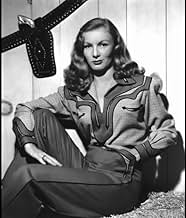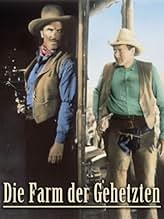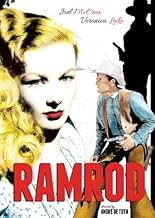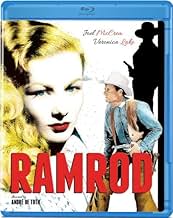IMDb RATING
6.7/10
1.9K
YOUR RATING
Story about violent feud between Connie Dickason, the owner of the Circle 66 ranch and rancher Frank Ivey, the self-proclaimed boss of an otherwise public grazing land.Story about violent feud between Connie Dickason, the owner of the Circle 66 ranch and rancher Frank Ivey, the self-proclaimed boss of an otherwise public grazing land.Story about violent feud between Connie Dickason, the owner of the Circle 66 ranch and rancher Frank Ivey, the self-proclaimed boss of an otherwise public grazing land.
Charles Ruggles
- Ben Dickason
- (as Charlie Ruggles)
Houseley Stevenson
- George Smedley
- (as Housely Stevenson)
Ward Wood
- Link Thoms
- (as Robert Wood)
Victor Potel
- Burch Nellice
- (as Vic Potel)
Storyline
Did you know
- TriviaAt the time of filming, Veronica Lake and director André De Toth were married. This film was their first screen collaboration.
- GoofsActor Houseley Stevenson's name is misspelled onscreen as "Housely."
- Quotes
Connie Dickason: From now on, I'm going to make a life of my own. And, being a woman, I won't have to use guns.
- ConnectionsReferenced in You Must Remember This: Veronica Lake (Dead Blondes Part 4) (2017)
Featured review
Contrary to previous reviews of Ramrod, de Toth's film is much more interesting than a "simple cattle vs. sheep" plot-driven western. Just look at Lake's Connie Dickinson. This is a typical femme fatale archetype taken straight from film noir (realistically, the character derives from hard-boiled pulp literature which Luke Short fused with his western story).
Sexually alluring Connie uses her potent sway over men to achieve her greedy ambitions of wealth and power, and is unafraid to send men to their deaths for her cause. Connie's strength of character is atypical of the western genre at this stage, and her strength seems to come from the relative weakness of the film's hero, played by Joel McCrea; who seems to lack the strong sense of moral certainty that the typical westerner was founded upon.
Along with Raoul Walsh's Pursued (1947), and Robert Wise's Blood on the Moon (1948), Ramrod stands as one of the few hybrids between film noir and the western. Regardless of your standpoint on the status of film noir, all of these films contain typical elements from the pessimistic noirs of the 40's and 50's, particularly formal and stylistic devices, as well as recurring personnel, especially directors, stars (ie. Robert Mitchum), and cinematographers. Crucially though, the western genre before this stage was a particularly optimistic one; look at Stagecoach (John Ford, 1939), Dodge City (Michael Curtiz, 1939), or even My Darling Clementine (Ford again, 1946); the three films I mentioned beforehand, including Ramrod, all offer instances of pessimistic worldviews, and morally ambiguous characters and situations, even though they all end with the hero getting the girl and riding into a westward sunset.
Sexually alluring Connie uses her potent sway over men to achieve her greedy ambitions of wealth and power, and is unafraid to send men to their deaths for her cause. Connie's strength of character is atypical of the western genre at this stage, and her strength seems to come from the relative weakness of the film's hero, played by Joel McCrea; who seems to lack the strong sense of moral certainty that the typical westerner was founded upon.
Along with Raoul Walsh's Pursued (1947), and Robert Wise's Blood on the Moon (1948), Ramrod stands as one of the few hybrids between film noir and the western. Regardless of your standpoint on the status of film noir, all of these films contain typical elements from the pessimistic noirs of the 40's and 50's, particularly formal and stylistic devices, as well as recurring personnel, especially directors, stars (ie. Robert Mitchum), and cinematographers. Crucially though, the western genre before this stage was a particularly optimistic one; look at Stagecoach (John Ford, 1939), Dodge City (Michael Curtiz, 1939), or even My Darling Clementine (Ford again, 1946); the three films I mentioned beforehand, including Ramrod, all offer instances of pessimistic worldviews, and morally ambiguous characters and situations, even though they all end with the hero getting the girl and riding into a westward sunset.
Details
Box office
- Budget
- $2,000,000 (estimated)
- Runtime1 hour 34 minutes
- Color
- Aspect ratio
- 1.33 : 1
Contribute to this page
Suggest an edit or add missing content






































